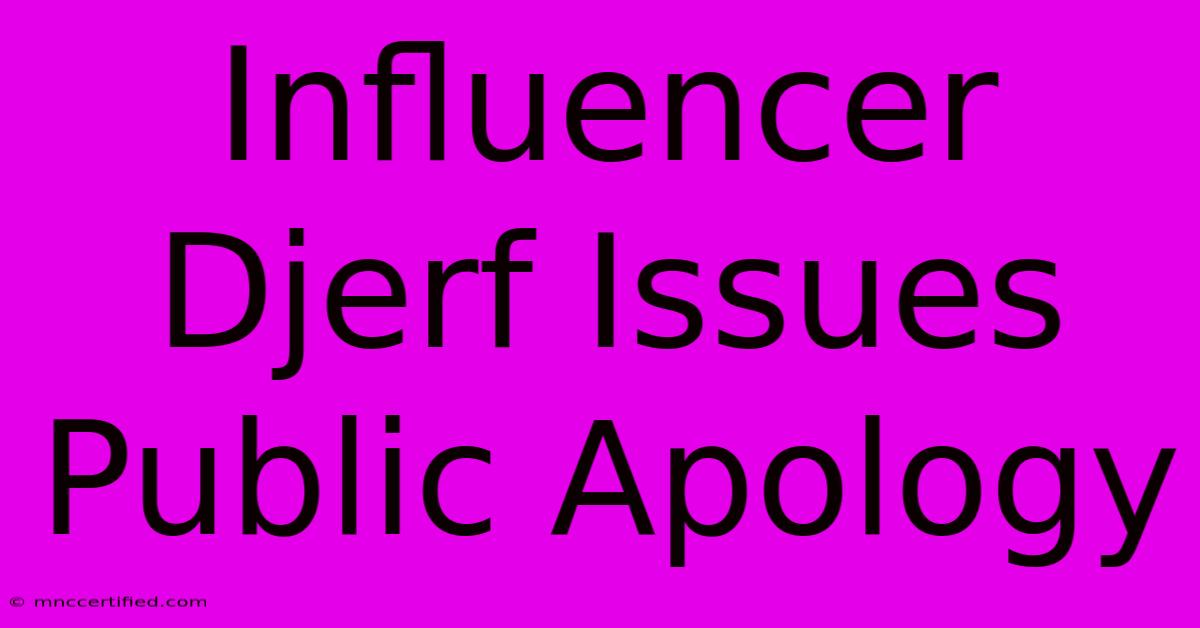Influencer Djerf Issues Public Apology

Table of Contents
Influencer Djerf Issues Public Apology: Addressing Recent Controversies
The popular fashion and lifestyle influencer, Djerf, recently issued a public apology addressing several controversies that have erupted online. This article delves into the specifics of the situation, examining the nature of the criticisms, the apology itself, and its reception amongst followers and the broader online community. Understanding this situation offers valuable insights into the complexities of online influence and the responsibilities associated with it.
The Nature of the Criticisms: A Multifaceted Backlash
The controversies surrounding Djerf weren't singular events but rather a confluence of criticisms that culminated in widespread backlash. These included allegations of:
- Cultural Appropriation: Accusations surfaced alleging Djerf inappropriately appropriated elements from various cultures in their fashion choices and content creation, causing offense and raising concerns about representation.
- Unethical Brand Partnerships: Questions were raised regarding the transparency and ethics of some of Djerf's brand collaborations, with accusations of misleading endorsements or a lack of disclosure about sponsored content.
- Lack of Accountability: Initial responses to the criticisms were perceived by many as insufficient, fueling further outrage and calls for accountability. This fueled a sense that Djerf wasn't taking the concerns seriously enough.
- Insensitive Social Media Posts: Past social media posts resurfaced, revealing comments or actions deemed insensitive or offensive by many in the online community. This added to the growing pile of negative sentiment.
The Impact of Social Media Amplification
The speed and reach of social media significantly amplified these criticisms. Hashtags related to the controversies quickly trended, exposing Djerf to a much wider audience than their typical followers. This rapid dissemination resulted in increased pressure for a public response and a formal apology.
Djerf's Public Apology: A Measured Response?
Following days of intense online scrutiny, Djerf released a public apology via their primary social media channels. The apology included:
- Acknowledgement of Wrongdoing: Djerf explicitly acknowledged the validity of the criticisms and expressed remorse for their actions and choices.
- Specific Examples of Regret: The apology detailed specific instances where they fell short of acceptable standards of behavior and cultural sensitivity. This level of specificity was crucial in demonstrating genuine contrition.
- Commitment to Change: Djerf committed to learning and improving, outlining steps they would take to avoid similar mistakes in the future. This included plans for increased cultural sensitivity training and improved transparency in brand collaborations.
- Call for Forgiveness: While acknowledging the gravity of their actions, the apology also implicitly sought forgiveness from their audience.
Analyzing the Effectiveness of the Apology
The effectiveness of Djerf's apology is a matter of ongoing debate. While some praised the acknowledgment of wrongdoing and the commitment to change, others remained skeptical, citing past behavior and questioning the sincerity of the apology. The long-term impact on Djerf's brand and online presence remains to be seen.
The Broader Implications for Online Influencers
The Djerf situation serves as a cautionary tale for all online influencers. It highlights the importance of:
- Cultural Sensitivity: Influencers must be mindful of the potential for cultural appropriation and strive for inclusivity and respectful representation in their content.
- Ethical Brand Partnerships: Transparency and honesty are paramount in brand collaborations. Clear disclosure of sponsored content is essential to maintain trust with followers.
- Active Listening and Accountability: Responding promptly and thoughtfully to criticisms is crucial. Ignoring negative feedback or dismissing concerns only exacerbates the situation.
The case of Djerf underscores the significant responsibilities that accompany online influence and the need for continuous self-reflection and a commitment to ethical conduct.
SEO Keywords:
- Influencer Djerf
- Djerf apology
- Influencer controversy
- Cultural appropriation
- Ethical brand partnerships
- Social media accountability
- Online influence
- Influencer responsibility
- Public apology
- Brand reputation
This article is optimized for search engines through the use of relevant keywords, clear headings, and a well-structured format. Further off-page SEO strategies, such as building backlinks from reputable sources and promoting the article on social media, would enhance its visibility and ranking on Google.

Thank you for visiting our website wich cover about Influencer Djerf Issues Public Apology. We hope the information provided has been useful to you. Feel free to contact us if you have any questions or need further assistance. See you next time and dont miss to bookmark.
Featured Posts
-
Shoe Zone To Shut Down Stores Alert
Dec 19, 2024
-
Bbc After Lineker Female Voices Rise
Dec 19, 2024
-
Peter Wright Retires Luke Gets A Mention
Dec 19, 2024
-
Uk Inflation Up 2 6 Eight Month High
Dec 19, 2024
-
Remembering Eddie Stobart Obituary
Dec 19, 2024